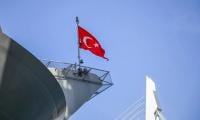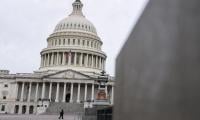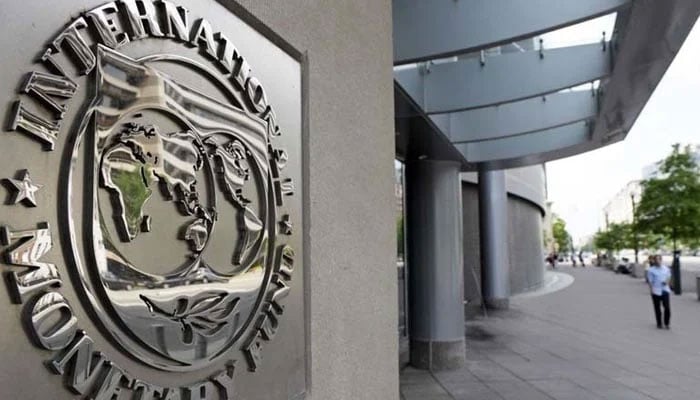Govt, IMF at odds over Rs900bn fiscal gap
IMF is asking to jack up the GST rate by 1 percent from 17 to 18 percent or impose 17 percent GST on POL products
ISLAMABAD: Amid the lingering stalemate over the fiscal gap, the International Monetary Fund (IMF) has worked out a larger gap of approximately Rs900 billion, equivalent to 1 percent of Gross Domestic Product (GDP). It is a major stumbling block in striking a staff level agreement.
However, Pakistani authorities have contested such a huge fiscal gap in achieving the primary deficit and asked the IMF for incorporating flow of reduction under the revised Circular Debt Management Plan (CDMP) and reduced amount of required additional subsidy of Rs605 billion against the earlier target of Rs687 billion.
Therefore, the fiscal gap stood in the range of Rs400 to Rs450 billion.
Top officials have completely ruled out any possibility of IMF condition about the signing of PTI Chairman Imran Khan for reviving the Fund programme and said that no such discussions took place with the IMF review mission.
“Differences still persist over ascertaining the exact fiscal gap between Pakistan and the visiting IMF review mission during the technical levels talks.
Once it’s finalised with the IMF, then the additional taxation measures will be firmed up, which will be unveiled through the upcoming mini-budget. Keeping in view this inability to reconcile the figure of fiscal gap, the technical level talks will continue on Monday and then policy level talks are expected to commence from Tuesday,” top official sources confirmed while talking to a select group of reporters in background discussions here on Saturday.
Top official sources said the government agreed in principle with the IMF to abolish electricity and gas tariff subsidies for the export-oriented sector because such kind of dole out was completely unacceptable to the Fund. The exporters scheme will be revised by bringing major changes to it, said the official. However, the IMF agreed to the Kissan Package and required power subsidy, 60,000 tube-well subsidies for Balochistan and a subsidy meant for AJK.
The Pak authorities conceded that the power sector had so far proved to be a major stumbling block on the way to achieving smooth sailing. Although, the circular debt for the gas sector also remained a problematic area, finally they managed to proceed on this issue. The expenditures overrun will breach the overall budget deficit target of 4.9 percent of GDP, which is likely to touch 6.5 to 7 percent for the current fiscal year.
When the fiscal gap will be ascertained by both sides, then the IMF will ask about additional taxation measures. The IMF is asking to jack up the GST rate by 1 percent from 17 to 18 percent or impose 17 percent GST on POL products but the government was resisting it tooth and nail.
The government is ready to slap the Flood Levy on affluent segments as well as on imports, slapping levy at the rate of 41 percent on windfall profits earned by the banking sector, enhance Federal Excise Duty (FED) rate on cigarettes, sugary drinks from 13 to 17 percent, enhance withholding tax rates on property transaction, air travel abroad and others. The IMF assessed that the FBR would face a shortfall of Rs130 billion in achieving the target of Rs7,470 billion.
The Pakistani authorities have prepared three options to convince the IMF for the striking staff level agreement. These three options basically seek cutting down expenditure and taking additional taxation measures with the objective of having less inflationary pressures.
Pakistan has sought a waiver on flood expenditures of Rs470 billion from the IMF and the Fund agreed to it. Pakistan and the IMF high-ups held an informal meeting here on Saturday in which the IMF shared its initial assessment of the fiscal gap of 1 percent of GDP, equivalent to Rs884 billion in achieving the primary deficit. It was decided to continue technical level talks on Monday, so the power and FBR meeting will continue to further exchange the data to reconcile divergent numbers. The IMF is expected to share nine tables of a macroeconomic and fiscal framework on Monday night or Tuesday after which both sides would hold policy-level talks.
It is expected that both sides would strike a staff level agreement by the conclusion of the talks on February 9, 2023. Then the IMF’s executive board will consider approval of the next tranche probably in March 2023.
The government seems ready to fill the fiscal gap of Rs400 billion through a combination of rationalization of expenditures, such as reducing the development budget and other stringent steps and taking additional taxation measures. They conceded that debt servicing had escalated to Rs5.2 trillion against the earlier target of Rs3.952 trillion for the current fiscal year. After taking the NFC share of the provinces, the Centre is left with no resources. The IMF also raised objections over the revenue surplus expected to be generated by the provinces but the Pakistani side assured it that the federating units would help curtail the overall deficit.
The Pakistani side explained the statement of Prime Minister Shehbaz Sharif to the visiting IMF review mission and told it that the PM’s statement was meant to make up minds of masses for undertaking tough measures as politicians wanted to save their political capital. The IMF team was also told the PM’s statement was not meant to blame the Fund for slapping tough conditions on Pakistan.
-
 NATO Air Defence Systems Stop Iranian Missile Heading Toward Turkiye
NATO Air Defence Systems Stop Iranian Missile Heading Toward Turkiye -
 Cruz Beckham Sends Birthday Message To Estranged Brother Brooklyn Despite Reported Rift
Cruz Beckham Sends Birthday Message To Estranged Brother Brooklyn Despite Reported Rift -
 Iran-US War: Senate Rejects Measure To Limit Trump’s Military Action
Iran-US War: Senate Rejects Measure To Limit Trump’s Military Action -
 Selena Gomez Opens Up About Mental Health Misdiagnosis
Selena Gomez Opens Up About Mental Health Misdiagnosis -
 Prince Edward Faces ‘hard Time’ In Accepting Andrew ‘disgrace ’
Prince Edward Faces ‘hard Time’ In Accepting Andrew ‘disgrace ’ -
 T.I. Says Sons Crossed A Line During His Feud With 50 Cent
T.I. Says Sons Crossed A Line During His Feud With 50 Cent -
 Brooklyn Beckham Ignores Victoria, David Peace Call, Responds To Nicola Peltz Instead
Brooklyn Beckham Ignores Victoria, David Peace Call, Responds To Nicola Peltz Instead -
 Prince Harry, Meghan Markle Can No Longer Be ‘DIY Royals’
Prince Harry, Meghan Markle Can No Longer Be ‘DIY Royals’ -
 Keke Palmer Gets Candid About 'dehumanizing' Child Star Experience
Keke Palmer Gets Candid About 'dehumanizing' Child Star Experience -
 Shamed Andrew Brand ‘most Arrogant’ By Diana Bodyguard
Shamed Andrew Brand ‘most Arrogant’ By Diana Bodyguard -
 Daniel Radcliffe Welcomes New 'Harry Potter' Era, Says It's Time To 'pass It On'
Daniel Radcliffe Welcomes New 'Harry Potter' Era, Says It's Time To 'pass It On' -
 AI Rivalry: Anthropic Investors Push To De-escalate Pentagon Clash Over AI Safeguards, Sources Say
AI Rivalry: Anthropic Investors Push To De-escalate Pentagon Clash Over AI Safeguards, Sources Say -
 Selena Gomez Reveals Handmade Birthday Gift Taylor Swift Created For Her
Selena Gomez Reveals Handmade Birthday Gift Taylor Swift Created For Her -
 Jamie Lee Curtis Doubles Down On Her Assertion About 'The Bear's Imminent End
Jamie Lee Curtis Doubles Down On Her Assertion About 'The Bear's Imminent End -
 Nicole Kidman Reacts To Daughters' Possible Future In Hollywood
Nicole Kidman Reacts To Daughters' Possible Future In Hollywood -
 Harry Styles Weighs In On The Origins Of His Muse While Talking About 'Carla’s Song' From Upcoming Album
Harry Styles Weighs In On The Origins Of His Muse While Talking About 'Carla’s Song' From Upcoming Album




